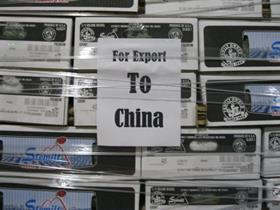
China’s decision in early 2013 to accept shipments of US pears has already resulted in two agreements between US growers based in Washington and Oregon and their Chinese partners.
Washington-based Stemilt Growers has teamed up with key importer Lantao, which is headquarted in Shanghai, to be the first promoters of Stemilt’s d’Anjou pears.
Stemilt’s sales and marketing vice president, Mike Taylor, emphasised the care taken in selecting a pear for the Chinese market.
“Our experience is the Chinese consumer appreciates a sweet and juicy piece of fruit,” said Taylor. “We expect there will be an education period to explain the difference between a typical Asian pear and our Western style pears.”
He also underlined the capabilities of Stemilt's partner company.
“We feel very confident that Lantao, our partners in China, will do a great job in exposing Anjous in the market, and increase their sales and acceptance with the Chinese consumers.”
Lantao is a well-established company, with marketing and distribution facilities in five different Chinese markets. The company’s president, John Wang, explained their initial approach to marketing the Washington pear.
“We decided to focus our introduction of d’Anjou pears initially on the Shanghai market,” he said. “Shanghainese are early adapters, and Shanghai was the first market to take black grape varieties from California.”
Meanwhile, Dalian Yidu Group, a leading importer based in northeast China, has accepted its first shipment of pears from Duckwall Fruit Co, a key grower-packer-marketer operating in Hood River, Oregon.
Nick Naseri, a buyer with Dalian Yidu, praised the effort Duckwall had put in to ensure it was selected for a partnership.
“After the agreement was reached by the Chinese and American authorities in late January to allow direct shipments of US pears into China, we contacted all our pear suppliers to find out when the USDA would allow them to issue phytosanitary certificates for the pear shipments,” said Dalian Yidu’s Nick Naseri. “Duckwall Fruit Company in Hood River, Oregon went through great efforts to make this all possible and was the first supplier that informed us they had the green light from the USDA.”
The first shipment arrived and was cleared on 22 February and was enthusiastically received, with a ceremony held at the port attended by government officials.
The product had been marketed in China by the Northwest Pear Bureau before the shipment's arrival, with a campaign in supermarkets offering consumers free samples to try the different taste and texture of the US pears.
Naseri is looking at the potential to expand the trade in the coming years.
“We'll ship about 15 more `container` loads directly to China this year,” said Naseri. “But we want to double that next season and maybe even do 40 loads.”
He also emphasised the potential for this agreement to set a precedent for future trade opportunities between the US and China, singling out apples as the next fruit to be approved by the Chinese authorities.
“We hope that will happen in the next two or three years,” he said. “We hope both sides can reach an agreement because it would really benefit all parties involved including US farmers, exporters, and importers.”



